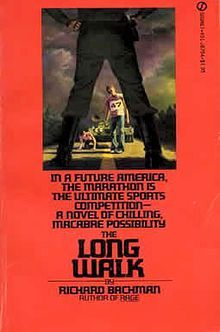Tracing The Trails Of Richard Bachman : The Long Walk
T he Long Walk was the second book to be published under the Bachman name and is probably one of the most on-the-nose titles I have ever seen for a book. Long Walk is a dystopian tale, with story and themes that would have a similar feel many years later to another Bachman book, The Running Man.
he Long Walk was the second book to be published under the Bachman name and is probably one of the most on-the-nose titles I have ever seen for a book. Long Walk is a dystopian tale, with story and themes that would have a similar feel many years later to another Bachman book, The Running Man.
In the modern landscape of our popular culture, dystopian fiction has become more trendy, but in the mid to late seventies, this was not as much the case. I recently read an interview with King in which he discussed his earlier endeavors with Bachman’s books, how he had expressed in interest in the dystopian to his publisher but was told that it would never catch on. I suppose this could be another reason why he chose to use the pen name in the first place. Bachman would have a little bit more freedom to tell the stories he wanted to tell, regardless of the market and what was popular at the time.
The story is simple in its concept. Every year, a hundred young men vie for an opportunity to take part in the Long Walk. In the course of the competition, the one who ends up the last person standing is the one who wins. The winner is awarded with literally anything they want for the rest of their life.
One other thing? The one who wins the Long Walk is also the last one still alive.
The rules of the game are simple. The crowd begins to walk, en masse, and once the game starts, you aren’t allowed to stop, for any reason. The crowd is followed by a trailing vehicle, basically a truck with armed soldiers. If you do stop, you are given a warning. If you don’t get moving you get a second warning. After your third warning, you will be shot and the contest will have one less participant. As a way of keeping things interesting, if a participant who has received a warning can go an hour without any incidents, one of his warnings will be wiped away.
At a glance, I’m sure that there would be some who would dismiss this book as being childish or simplistic, not worth the time it would take to read it. However, I found that underneath this veneer of simplicity, you have a story that is actually very complex and difficult to craft. Don’t believe me? I would challenge you to write a three hundred page book about walking.
And in addition to that, you have a ton of players wandering around the stage so you have to be able to pick out a few and give them unique voices and bring their individualities to bear on the story.
Regardless of what you have to say about King as a writer, I think few would deny that he has an aptitude for creating characters that have depth. This ability was clear, even as early as this novel was written as the characters are pretty much the only thing he had access to. The drama of the story, the tension and the struggles, they all have to be defined in reference to the characters. How do you construct a story that is this long without constantly repeating the same three or four scenes over and over? I honestly don’t know. I can say with certainty that if I were to try writing something like this, I would end up quitting pretty quickly out of frustration and hating every word that dripped out of my keyboard.
There are a few things I particularly appreciated about this book. There is a habit I think can be common for less experienced writers to feel like you have to explain everything in unending detail. To give an example, I spent a few years in my late twenties, pretending to be a musician and when I was taking bass lessons, one thing that really stuck with me was when my teacher tried to explan that when playing, you shouldn’t feel the need to fill every empty space with a note. That sometimes you can be as effective with the way you use pauses and breaks as you can with your actual playing.
The relevance here is that I think other authors might be tempted to break up a story like this with a ton of exposition, relating to the reader the nature of the world in which this book is set. MKing doesn’t seem to give a ton of details about the specifics. While information like that might have been intellectually interesting, I don’t think it would have contributed anything to the story itself. It might be nice to know more about the world of this book, but it really isn’t needed. King was brave enough to stick with the heart of the story and the aspects that were important.
One point I made regarding the first Bachman book, Rage, was that it felt to me like it tried to hard to be a sort of earnest exploration of the human condition. I think King accomplished something similar here, but without feeling quite as contrived as Rage does. I think you see the full range of human emotions through the horrible experience of this competition and King does a great job highlighting all of these, putting them on the display stand that this book represents. For me, The Long Walk felt genuine, more of a natural and organic exploration of human nature. With Rage, I felt more like he wanted to make specific commentary about the human condition and tried to mold together a story that would make that point. There might not seem like much of a difference between the two, but the net result is that I found myself enjoying The Long Walk more than I did Rage, for this reason.
There is a certain amount of suspension of disbelief that you have to employ here. Bowel movements would seem to make the whole endeavor impossible but you kind of have to let go of the little things and focus on the larger picture of the story. Just go with it and remember this, they only had one bathroom on the Enterprise.
I think any artist learns something about their voice with each project they put behind them and already, from Rage to The Long Walk, I can see an improvement in craft and technique.
Thanks for checking out the blog. Tune in next week when we turn our attention to Roadwork.
Until then.
My name is Chad Clark, and I am proud to be a Constant Reader.






